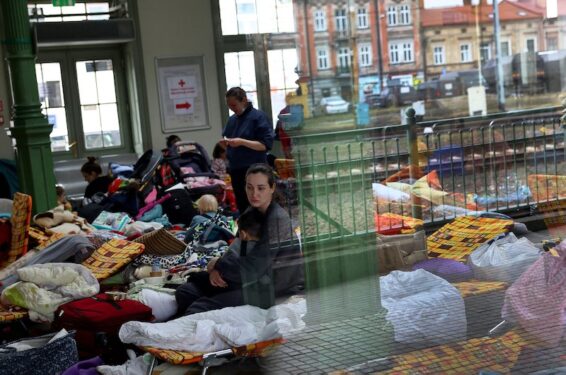By Paulina Guzik
KRAKÒW, Poland (Crux) — It was Saturday, three days into the Russian invasion of Ukraine when a friend called Jerzy Donimirski, a hotel owner from Kraków.

“He told me that while half of the country stands in the line at the border to pick up a Ukrainian family, there are people that have nowhere to go, no friends, no relatives,” he told Crux.
[Related: Pope Francis Says ‘Rivers of Blood’ Flowing in Ukraine; Vatican Ready to Help]
So Donimirski decided to open his four-star hotel in the heart of Kraków, by the Floriańska historical gate, to refugees.
“It is war everyone fears. I just had to do it.”
On Monday, Feb. 28, the first 20 people — six adults and 11 children — occupied rooms in his hotel.
“I thought it’s not too much of a burden for our hotel to take 20 more,” so he sent another bus to the border with Ukraine. Today, he has 45 refugees in Hotel Polski.
It is because of people like Donimirski, a Catholic and member of the Order of Malta, that Poland has a million refugees in its territory and not a single refugee camp.
As the Polish Ambassador to the United States, Marek Magierowski, told CNN: “This is probably the first migration crisis in Europe’s history, in which the host country doesn’t need to build refugee camps.”
“Here in Poland, I really felt what fraternity is,” Olga Panivnyk told Polish Television on March 6. She escaped Ukraine a week ago.
“It was scary — there were planes flying over our heads” she recalled. “Some of our friends had to stop on the way because there was a shooting in the fields.”
Refugees crossing the border with Poland are welcomed with a greeting from the Border Patrol: “You are safe now.”
Waiting for them are volunteers from government and Church organizations, but also ordinary Poles who are bringing everything from food to toys to the border.
There is not a town in Poland without Ukrainian refugees.
Bishops are calling on the people of the country to welcome Ukrainians to their parishes and private homes. Some are hosting Ukrainian themselves, like Bishop Andrzej Jeż of Tarnów.
“On Friday, four members of the family from Iwano-Frankowsk inhabited our Curia. Today another family from Zytomir will arrive,” the diocese of Tarnow wrote in a tweet on March 5.
Dominican Sisters from Broniszewice, in central Poland, are officially running a humanitarian corridor with trucks moving regularly between Poland and Ukraine, where their sisters serve in Żółkiew, which is outside L’viv.
“We load trucks of food and supplies, and a minivan always accompanies them — it has several seats. They never go back empty. We take those that want to flee,” Sister Tymoteusza Gil told Crux.
One of the boys living with them now is 13-year-old Bogdan Barabash. His mother was working for the Dominican sisters before the war.
“I tell my friends in Ukraine every day what happens in Poland,” he told Crux. His grandmother and uncle stayed in Ukraine.
While Poland has opened its doors to those fleeing Ukraine, a constant influx of refugees may become challenging soon.
“It is only the beginning,” Bishop Krzysztof Zadarko, head of the Council for Migration of the Polish Bishops’ Conference, told Crux.
“What Poles do is fantastic, and our hearts are big, but vast expert knowledge is needed to host that many refugees in the long term,” he said.
“Poland needs to work immediately with migration experts from other countries because with what we still see in Ukraine regarding war devastation we need to be ready for many more refugees,” the bishop added.
Donimirski said he understands the challenge. Hosting 45 refugees is not an easy operation, even for a hotel owner.
“I asked the prestigious Nowodworek high school in Krakow for help — every day a different classroom will be providing food supplies and our cooks will cook them,” he told Crux.
“But we need systemic help and for sure after a month we will have to think of relocating those families to apartments and more of permanent places of stay so that they can integrate fully,” he added.
Despite the warm welcome, what Ukrainian families dream of most is returning home.
“On one hand I would love to do that,”, said Panivnyk. “On the other, I don’t know whether it will be possible, our district in Kyiv is constantly shelled and shot at.”
“One day you just wake up and the life you had to this moment is gone,” she told Polish television. “And then you realize the most precious thing you have is the people you love and can take with you.”
Bogdan says he just wants one thing: “That the war is over.”
